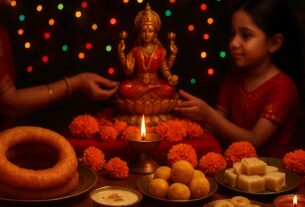Introduction
Chandi Purnima is a major Hindu festival dedicated to the worship of Shakti (divine feminine power), celebrated with devotion, fasting, and spiritual rituals. Every year, it is observed on the full moon day (Purnima), with devotees performing special puja, havan, and mantra chanting. In Nepal, Chandi Purnima holds immense religious and cultural significance.
According to Puranic texts, Chandi Purnima is associated with the worship of Goddess Durga or Shakti. This festival is believed to bring spiritual growth, morality, and positive energy not only to individuals but to society as a whole.
In this article, we explore the religious significance of Chandi Purnima, its rituals, traditions, benefits, and its impact on Nepali society.
Religious Significance
Worship of the Goddess
During Chandi Purnima, devotees worship Goddess Durga, Parvati, or other forms of Shakti. Devotees perform puja, havan, and mantra chanting at home, in temples, or in open spaces.
Merit and Blessings
Observing puja, havan, and fasting on this day is believed to increase spiritual merit. These rituals purify the mind, body, and soul. Performing the rituals properly is said to bring positive energy and transformative benefits in life.
Life Lessons from Puranas
1. Righteousness and Duty
Chandi Purnima teaches that following dharma and leading a life of duty guides individuals toward spiritual growth.
2. Courage and Inner Strength
Worship and meditation on the Goddess are believed to enhance courage, mental strength, and resilience.
3. Patience and Self-Discipline
Fasting and meditative practices instill patience and self-discipline, essential for facing life’s challenges.
4. Devotion and Surrender
Complete devotion and surrender to the Goddess facilitate spiritual growth. Devotion provides peace of mind and stability.
Traditions and Rituals
Puja Items: Lamps, incense, flowers, fruits, water, betel nuts, and sacred items.
Havan and Mantra Chanting: Havan performed at home or in temples is believed to destroy sins and enhance spiritual merit.
Fasting: Many devotees abstain from grains and eat only fruits, milk, or drink water throughout the day.
Social and Cultural Impact
Collective worship and havan strengthen community bonds.
Opportunities for charity and service increase.
Young generations learn devotion, ethics, and spiritual values.
Benefits of Chandi Purnima
Religious Benefits:
Elimination of sins and increase in spiritual merit
Growth in devotion and religious practice
Spiritual Benefits:
Mental peace and purification
Improvement in patience and self-discipline
Social Benefits:
Fosters cooperation and collaboration in the community
Encourages service, charity, and justice
Personal Benefits:
Enhances mental strength, patience, and decision-making
Develops leadership and problem-solving skills
Promotes morality and adherence to dharma in daily life
Conclusion
Chandi Purnima is not only a festival to worship the Goddess but also an opportunity for devotion, courage, self-discipline, and spiritual growth. In Nepal, it positively influences both personal and social life.
Through puja, havan, fasting, and meditation, devotees gain spiritual benefits while also promoting cooperation, charity, and dharma in the community.





